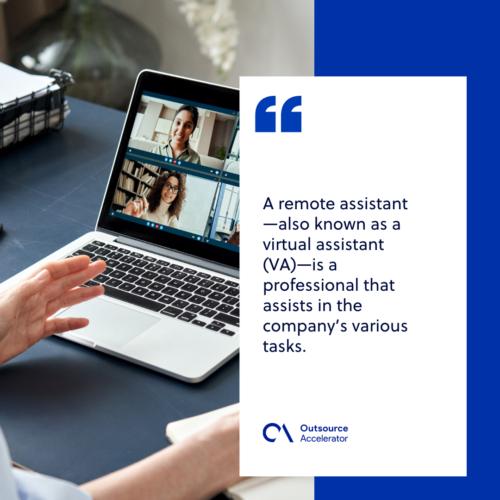Remote Professionals: Your Route to a Better Work-Life Balance
Remote Professionals: Your Route to a Better Work-Life Balance
Blog Article
Top Abilities Every Remote Expert Demands to Be Successful
As remote work proceeds to improve expert landscapes, recognizing the important skills that add to success in this environment is significantly crucial. Reliable communication, time management, self-motivation, versatility, and technological effectiveness are essential competencies that can considerably affect a remote specialist's efficiency.
Effective Interaction Skills
In today's remote workplace, reliable interaction skills are essential for success. When groups are spread across different locations, the capacity to share ideas clearly and pay attention actively is paramount. Strong interaction promotes cooperation, lowers misunderstandings, and improves efficiency.
An essential part of reliable communication is adaptability. Remote specialists need to be able to tailor their interaction designs to match diverse audiences, whether via composed reports, video telephone calls, or immediate messaging. Remote Professionals. Clarity in written communication is specifically essential; well-structured documents and concise emails assist prevent complication and make sure that messages are recognized as meant
In addition, active listening plays an essential duty in remote interactions. By showing listening and asking clearing up questions, people can build relationship and count on among employee, which is essential for preserving a cohesive workplace.
Furthermore, knowledge with different interaction tools is essential. Proficiency in video conferencing systems, project administration software, and collaborative applications not just improves communication efficiency but also allows smooth synergy.

Time Administration Techniques
Just how can remote professionals efficiently manage their time in an environment full of disturbances and contending priorities? One efficient technique is the Pomodoro Technique, which includes damaging work right into intervals, traditionally 25 minutes long, followed by brief breaks. This technique boosts focus and reduces fatigue, allowing professionals to keep productivity throughout the day.

In addition, setting clear goals and target dates is essential. Developing weekly and everyday purposes promotes responsibility and provides an orientation. Making use of electronic devices such as project management software can assist in job tracking and improve partnership among group members.
Self-Motivation Approaches
Self-motivation is the driving pressure that enables remote professionals to flourish in a flexible workplace. To cultivate this crucial ability, people can carry out a number of effective approaches that cultivate autonomy and productivity.
First, setting clear, achievable objectives is vital. By damaging bigger tasks into smaller sized, convenient milestones, remote workers can maintain emphasis and experience a feeling of success as they proceed. This technique not only enhances inspiration yet likewise offers a roadmap for daily tasks.
In addition, establishing a devoted workspace can significantly influence self-motivation. An assigned location without disturbances assists in producing a professional mindset, signifying to oneself that it is time to function.
Regularly scheduling breaks is another important strategy. Short intermissions aid Website recharge power levels and sustain concentration, avoiding fatigue and promoting sustained performance throughout the day.
In addition, leveraging positive reinforcement can boost inspiration. Commemorating tiny success or rewarding oneself after finishing jobs can create a positive feedback loop that motivates continuous effort.
Eventually, taking on these self-motivation approaches encourages remote experts to maintain high degrees of efficiency and complete satisfaction in their job, guaranteeing they continue to be engaged and effective in their functions.
Adaptability and Flexibility
Flexibility and flexibility are important qualities for remote experts browsing the ever-changing landscape of remote work. As companies significantly embrace hybrid models and changing concerns, remote workers must be prepared to adapt to new situations with dexterity. This requires a mindset that embraces adjustment as opposed to resists it.
Remote experts often deal with varying time zones, varied group characteristics, and evolving project requirements. Those who can pivot swiftly in action to these difficulties are more probable to maintain efficiency and foster partnership. Flexibility in scheduling can additionally enhance work-life equilibrium, permitting experts to enhance their outcome while accommodating personal dedications.
Moreover, adaptability extends past simple schedule modification; it involves a desire to discover and take on new tools or methods as they emerge. Continual discovering and visibility to feedback are important a knockout post elements that encourage remote workers to thrive in uncertain atmospheres. By growing these abilities, remote professionals not just improve their very own efficiency however also add positively to their companies and groups.
Technical Effectiveness
In the context of remote work, technological proficiency is increasingly essential as specialists depend on different electronic devices to promote interaction, project, and partnership management. Proficiency of software application applications, cloud systems, and communication devices is essential for smooth procedures. This consists of familiarity with video clip conferencing devices like Zoom or Microsoft Teams, project management software program such as Asana or Trello, and collective systems like Google Workspace or Slack.
Furthermore, technological effectiveness extends to understanding cybersecurity techniques, ensuring that sensitive information stays shielded throughout digital communications. Remote specialists should also be adept at fixing typical technological concerns, as dependence on innovation indicates that troubles can develop suddenly. This ability not only reduces downtime however also contributes to a much more effective workflow.
Furthermore, staying updated on emerging innovations and patterns in remote work can offer an one-upmanship, enabling professionals to leverage new tools that improve productivity. Overall, technological effectiveness is a fundamental ability that encourages remote employees to navigate the electronic landscape efficiently, guaranteeing they can add meaningfully to their teams and jobs. In a progressively electronic globe, this ability set is not just beneficial; it is essential for success.
Final Thought
Finally, the successful navigating of remote job environments requires an extensive ability encompassing efficient interaction, proficient time monitoring, robust self-motivation, and the capacity to adapt to changing scenarios. Additionally, effectiveness in appropriate technological tools is vital for maintaining efficiency and collaboration. By growing these necessary skills, remote experts can boost their efficiency, foster favorable communications with coworkers, and ultimately prosper within the evolving landscape of remote work.
As remote job continues to improve expert landscapes, recognizing the crucial skills that contribute to success in this setting is increasingly crucial.Adaptability and adaptability are vital traits for remote experts navigating the ever-changing landscape of remote job. By cultivating these abilities, remote experts not only improve their own efficiency however additionally contribute favorably to their teams and companies.
In the context of remote job, technological effectiveness is increasingly crucial as specialists depend on numerous electronic tools to help with project, partnership, and communication monitoring. By cultivating these necessary abilities, remote specialists click here to read can enhance their performance, foster positive interactions with colleagues, and eventually prosper within the progressing landscape of remote work.
Report this page